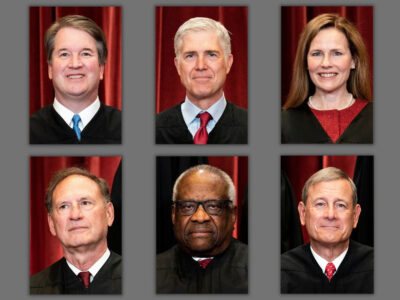Today’s Vaccine Cases: Implications for Climate Change Regulation
Today’s ruling are (somewhat) good news in terms of West Virginia v. EPA?
Today, the Court’s conservative Justices split the difference in two cases involving vaccine mandates, striking down OSHA’s mandate but upholding a more limited mandate for healthcare workers. The cases also split the conservative Justices themselves, with three hardliners (Thomas, Alito, and Gorsuch) seeking a more activist ruling in the OSHA case and dissenting in the healthcare case, while the more moderate block (Roberts, Kavanaugh, and Barrett) supported a narrower opinion in the OSHA case and all but Barrett voted to uphold the healthcare mandate.
I agree with the Court’s remaining liberals that both mandates should have been upheld. Today, however, I’m going to focus instead on the conservative split and what it might mean for environmental law. In particular, I want to say something about West Virginia v. EPA, which involves the scope of EPA’s authority to restrict carbon emissions from power plants.
The majority opinion in the OSHA vaccine case essentially characterizes the OSHA regulation more a general public health rule than a workplace safety rule, because it is not tied to the risks of particular types of workplaces or industries. The majority also finds no precedent for a rule of this kind in previous OSHA actions, and it views the vaccine mandate as involving “vast economic and political significance.” The opinion then asks if the statute OSHA relied on “plainly authorizes” the mandate and concludes that it doesn’t.
The three hardliners emphasize the need to restrict agencies and link this to the doctrine that Congress cannot constitutionally delegate legislative powers to agencies. They emphasize that narrow interpretations of statutes prevent “government by bureaucracy supplanting government by the people.” Indeed, they say, if the statute “really did endow OSHA with the power it asserts, that law would likely constitute an unconstitutional delegation of legislative authority.” None of the other three conservatives joined this concurring opinion, and the language of the majority opinion is much more restrained.
The other case involved a regulation by the Secretary of Health and Human Services (HHS) that requires vaccination of workers at healthcare facilities that receive Medicare or Medicaid. This mandate was challenged by two groups of state governments. The language of the statute involved is actually vaguer than the language of the OSHA statute, but the majority upheld the HHS regulation anyway. The majority thought it was clear that the regulation was necessary to promote patient health and safety, and that vaccination requirements are common for healthcare workers. The Court also stressed that healthcare workers and public health organizations “overwhelmingly support” the regulation. The three hardliners dissented along with Justice Barrett, arguing that the statutory language was unclear at best, and that if Congress had wanted to grant “authority of a nationwide vaccine mandate, and consequently alter the state-federal balance, it would have said so clearly.” Given that she agreed with the hardliners on the outcome in both cases, Barrett’s failure to join their concurring opinion in the OSHA case may be significant.
What about the West Virginia case? The case is about what measures EPA can use to reduce carbon emissions from power plants. The Obama Administration said that EPA could require states to shift away from use of carbon emitting generators while the Trump Administration said that EPA could only require measures to reduce the amount of carbon per kilowatt of power at gas and coal-fired plants. The D.C. Circuit sided with the Obama Administration but didn’t review the specifics of the Obama regulation. The big issue before the Supreme Court is simply whether EPA can require states to shift their sources of power. The challengers argue that EPA is thereby taking over regulation of the power grid, that this is a question of “vast economic and political significance,” and that EPA’s hands are therefore tied.
The conventional wisdom is that the Court’s conservatives grabbed the case, without waiting to see what kinds of regulation EPA would come up with on remand, with the intent of reversing the D.C. Circuit. EPA and its environmental allies have been focused on getting a “soft landing,” or to put it another way, in losing the case in a way that would do minimal harm to future regulations. A loss in the case still seems very likely, but the odds of a soft landing may have improved.
EPA faces a couple of obstacles in terms of winning. The approach taken by the Obama Administration doesn’t have much precedent at the agency, and the statutory language is at best ambiguous. The opposition will try to paint the regulation as being about controlling the electric power mix (coal vs. gas vs. renewables), rather than about regulating emissions. One point on the other side is suggested by the health worker mandate case: As in that case, the impetus is coming from third parties rather than from the parties who would be directly regulated. In the West Virginia case, the appeals to the Court weren’t brought by the industry regulated by EPA (power generators); instead, they were brought by coal interests. And EPA is clearly very much interested in emissions, not in regulating the grid. So EPA has a chance to win, but it’s still an uphill battle.
However, it seems likely that a loss could be restricted to measures that look to the Court like regulation of the power grid rather than of individual emissions sources. That would still leave EPA with a number of other tools it might use to limit power plant emissions, like requiring coal-fired plants to cofire with natural gas or biomass. It looks like the moderates aren’t game for a massive attack on regulatory power of the kind that environmental advocates feared. Let’s hope so, anyway.








Reader Comments